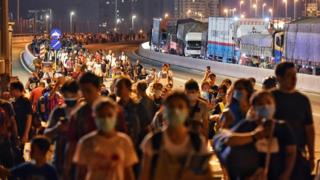
- Many Asian nations are facing an increasing battle to stem the spread of coronavirus, amid a World Health Organization warning that some needed to take "aggressive measures"
Many Asian nations are facing an increasing battle to stem the spread of coronavirus, amid a World Health Organization warning that some needed to take “aggressive measures”.
Malaysia, Sri Lanka and the Philippines are among nations imposing strict border controls.
Cases in the South Asian subcontinent are still below 500 but there are fears a spike could overwhelm health systems.
There are 185,000 cases globally, with 7,500 confirmed deaths.
Asian stocks have continued to fall as worries about the coronavirus pandemic eclipsed hopes that major stimulus plans would ease the impact of the outbreak.
What was the WHO warning?
It was issued for the organisation’s South East Asia region, although this contains 11 nations spread widely, including Indonesia, Sri Lanka, Thailand, Bangladesh and North Korea.
Poonam Khetrapal Singh, regional director of the WHO South East Asia region, said on Tuesday that “more clusters of virus transmission are being confirmed”.
“We need to immediately scale up all efforts to prevent the virus from infecting more people,” Dr Khetrapal Singh said. “We clearly need to do more, and urgently.”
The WHO said the numbers in its South East Asia region showed that “some countries are clearly heading towards community transmission of Covid-19”.
It called for continued efforts to “detect, test, treat, isolate and trace contacts”.
Dr Khetrapal Singh said “practising social distancing [could] not be emphasised enough… this alone has the potential to substantially reduce transmission”.
“We need to act now,” she said.
Many regional countries inside and outside the WHO’s definition of South East Asia have had a slow response to the outbreak, only taking drastic measures in recent weeks or days as the number of cases continue to grow.
Where are the infections increasing?
Almost all nations are seeing increases, although the rates vary widely.
Myanmar and Laos have both not reported any cases – though experts have seriously doubted the credibility of this.
A spokesperson for Myanmar’s government claimed that people’s “lifestyle and diet” had protected them from the virus. But it has imposed restrictions on arrivals and the UK government is now advising against all but essential travel there.
There are also no reported cases of the virus in Timor-Leste.
China still has the highest number of confirmed cases, with more than 80,000, but its new infections are almost exclusively from people arriving from abroad and are very low.
South Korea has also been praised for its attempts to control the virus and its 8,413 cases have seen it fall below Germany to sixth in the running list of cases compiled by Johns Hopkins University.
It has been rapidly testing thousands of people and has a number of innovative ways to do so, including “drive through” tests.
Although it had been on a downward trend in new infections, it has now seen small clusters breaking out across the country, with 93 more cases in the past 24 hours. Dozens of sick and elderly patients in a hospital in Daegu were infected.
Pakistan’s cases have now risen to 245, with the total of reported cases for the South Asian subcontinent reaching 482.
Thailand reported 35 new cases on Wednesday, taking its total infections to 212, officials said. Four of the cases were linked to an entertainment venue and 13 to a boxing bout, both in Bangkok.
Indonesia on Wednesday announced its biggest daily rise, 55 more cases taking the total to 227, with 19 deaths.
Malaysia has warned of a fresh spike in cases, saying there is only a “slim chance” of breaking the chain of infections.
A mass Muslim gathering last month is linked to nearly two-thirds of its infections and thousands of attendees are yet to be tested.
What are the nations doing?
From Wednesday, Malaysia is preventing citizens from travelling overseas and visitors from entering until 31 March at least.
Many Malaysians who commute to work in Singapore had to queue to cross the border before the midnight deadline, and will have to stay there.
Streets in the Malaysian capital Kuala Lumpur were largely empty and supermarket chains are enforcing limits on purchases of staples.
Thailand has closed schools, bars, cinemas and other entertainment centres.
The Philippines, which has 202 cases and 17 deaths, has imposed some of the toughest movement controls, effectively quarantining about half of its 107 million population.
But it reversed a decision to ban all international flights, and foreign nationals may now fly out, although arrivals will face strict quarantine protocols.


